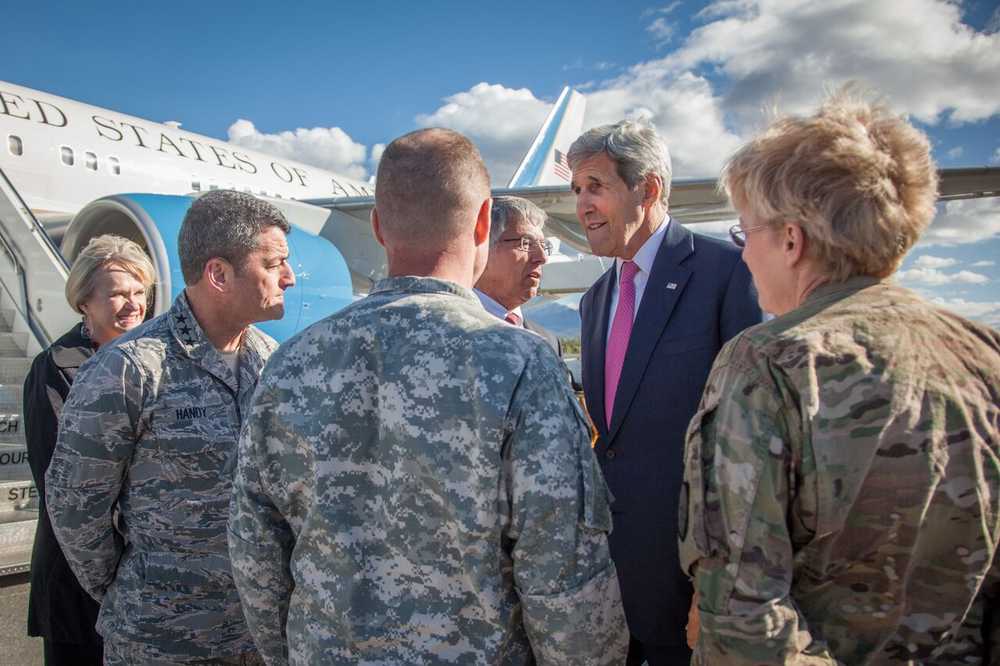In a half-hour talk with Alaska newspaper reporters Sunday evening, Secretary of State John Kerry put forward a technology-focused view of fighting climate change that is expected to be on display today in Anchorage.
“Coal is problematic, I think, in the long term, but oil, gas can be burned in more effective, smarter ways.
What we need to do is make sure our technology is being encourage to move in those directions more rapidly.”
Today in Anchorage, Kerry hosts the GLACIER conference, billed as an attempt to “generate momentum and expedite progress in addressing some of the most pressing issues facing the region.”
Atop the list: Climate change and how to adapt to it.
“I think the President understands that this is one of the most pressing issues that we face,” Kerry said.
Attending today’s conference are representatives of 20 nations and the European Union, including seven foreign ministers, if Kerry is counted.
Talking about climate change is a tall task in a place like Alaska, which derives most of its state revenue from oil, which when burned is the largest source of carbon emissions driving climate change.
Earlier this month, the Obama administration approved a further stage of oil survey drilling in the Arctic, an action that drew sharp criticism from environmental groups.
At the same time, pro-development Alaskans and others have said the administration has not done enough to encourage drilling.
They point to its actions that would shield the coastal plain of the Arctic National Wildlife Refuge from oil exploration.
Emphasizing technology, including better environmental observation, greater fuel efficiency, energy efficiency and home insulation, is a compromise approach.
All of those elements are featured on the GLACIER conference’s agenda.
Kerry spoke at length about how the U.S. can continue to burn oil, natural gas and other fossil fuels while still staying below a level of global warming that some scientists say would be catastrophic.
“If you’re putting the proper requirements on how that oil is burned and used, you can meet those standards,” he said.
The President has increased the fuel efficiency standards for cars and trucks, and Kerry said that’s progress.
“Technology itself is proving new ways to be able to use certain things and use them effectively,” he said.
While the ultimate goal is to switch America and the world onto renewable sources of energy, things like solar, wind and water power, he said that switch must happen in a way that doesn’t hurt the economy.
“The more we can push people in the right direction, the better our chances of making it,” Kerry said, “but you’ve got to balance it, obviously, with the fundamentals of your economy and the basic needs.”
Global climate change wasn’t the only issue Kerry discussed with the Alaska reporters.
As he was leaving the discussion, he was asked about Canada’s mining projects in British Columbia near its border with Alaska.
Those so-called “transboundary mines” have raised concerns among fishermen and activists who fear that a mine waste spill could dump billions of gallons of toxin-laced byproducts into rivers that feed the Southeast salmon industry.
Last year, the Mount Polley Mine spill dumped 6.34 billion gallons of contaminated tailings into Canada’s Polley Lake and its downstream waters, increasing those fears.
“That’s a serious issue,” Kerry said, “and the Mount Polley tailings issue is a serious issue and obviously we are very concerned about Alaska, about the integrity of Alaska’s rivers. We’ve raised it with local governments, we’ve raised it with the federal government, and we will continue to, but it’s a … serious challenge. Downstream impacts should not be taken lightly by any country, anywhere.”
While the President will stay in Alaska after the GLACIER conference to visit Seward, Dillingham and Kotzebue, Kerry will leave the state after the conference concludes.
“I have a little thing called Iran,” he said.
Kerry revealed he will be traveling to Philadelphia to deliver a speech Wednesday on the proposed nuclear deal with that Islamic country. Congress is expected to cast an up-or-down vote on the deal unless enough Democratic Party lawmakers in the U.S. Senate filibuster that vote and allow the deal to happen without Congressional intervention.
“”I have to get back to do that (speech) because we have some people who have to be persuaded,” Kerry said

